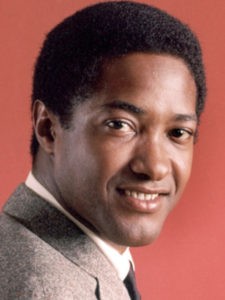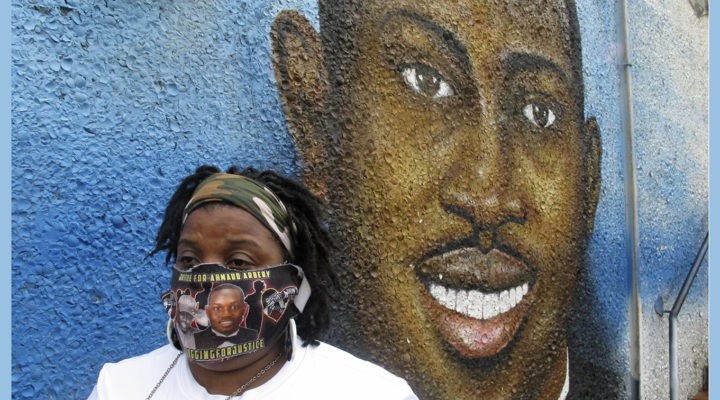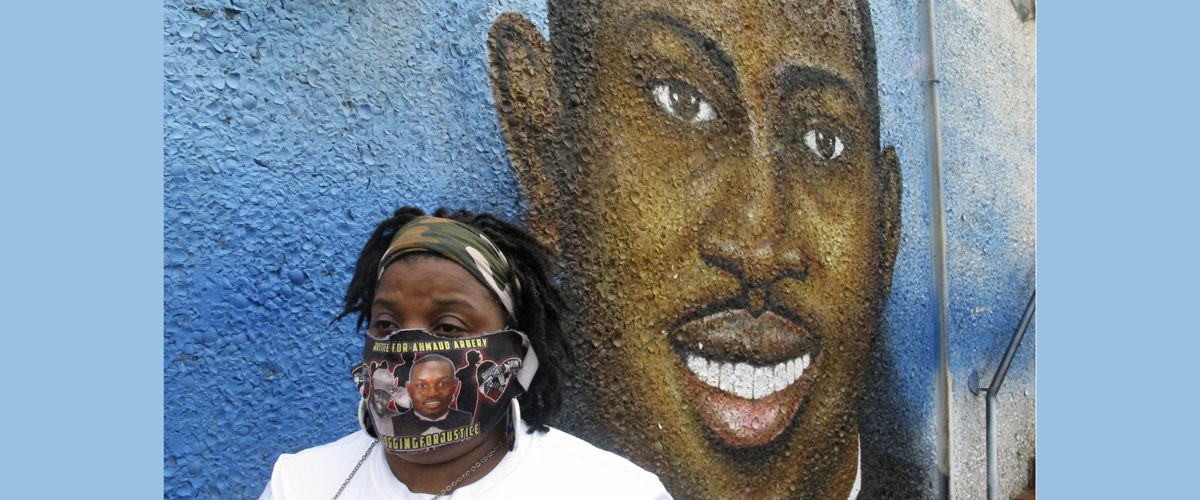Cooke wrote this song in the early 1960s as a protest to support the Civil Rights Movement. It was a volatile season for this country, as Black Americans sought equality. Because the quest for equality has not ended, will the church still boldly proclaim, “a change is gonna come,” and then commit to living as a holy catalyst for change?

Kathy Manis Findley
Sometimes change descends upon us when the last thing we want is change. That kind of unwanted change has come to Brunswick, a small Georgia town with a total population of 16,122. The change, it seems, has overtaken the town since Ahmaud Arbery was killed by three white men on Feb. 23, 2020. Arbery was on the ground, still gasping for air, when Glynn County police arrived. They did not immediately help him. Neither did they arrest the three men standing nearby, the three white men accused of killing Arbery.
Murder trial begins
The murder trial began on Monday for Travis McMichael, Gregory McMichael and William Bryan, the three men accused of killing Arbery as he was out jogging. The trial begins more than a year and a half after Arbery, who was Black, was gunned down on a residential street in southeastern Georgia by three white men.
The local court summoned 1,000 people for possible jury duty — roughly one in every 80 people living in Glynn County. News reports predict that jury selection could take weeks, as lawyers and court officials seek impartial arbiters for this internationally known tragedy that Georgia Gov. Brian Kemp called “horrific.” On Monday alone, 85 residents were summoned as potential jurors. One of the defense attorneys said, “I have no confidence that we can get a jury impaneled here.” According to Census data, the town of Brunswick is 40% white and 55% Black.
Arbery’s murder quickly took on worldwide significance. So has the trial, which is being livestreamed as a Court TV special. Because race is at the heart of everything that happens in this trial, the question being pondered in America and internationally is, “What is the value of a Black life?”
“Race is at the heart of everything that happens in this trial.”
Questions just as significant are, What is the value of any person who is othered? What is the value of my life? The church must ponder such questions as people of faith seek the religious and moral compass necessary to influence positive change by moving to transform injustice. We ask those hard questions relentlessly, as we must, while the whole world is watching to see what happens in this trial.
All the while we cling to the hope that “a change is gonna come.”
Modern-day lynching
President Biden compared Arbery’s murder to a lynching. In fact, many people — including Arbery’s grieving father, Gregory Arbery, attorney Benjamin Crump and Atlanta mayor Keisha Lance Bottoms — characterized the killing as yet another modern-day lynching. In a 2020 commentary about Arbery’s murder published by The Marshall Project, journalists Jennifer Rae Taylor and Kayla Vinson accentuated the lynching idea by describing this historical event:
On February 21, 1891, almost exactly 129 years before white vigilantes fatally shot Ahmaud Arbery in Brunswick, Ga., a mob of white men lynched two Black men named Wesley Lewis and Henry Jackson just outside of Brunswick. Without trial or investigation, they were hanged from a tree, riddled with more than 1,000 bullets, then left on display for thousands of white spectators to view. As one newspaper described the scene:
“…the population of Brunswick turned out en masse to visit the scene of the lynching. Vehicles were at a premium and it is estimated that more than 3,000 people made the trip to Dent Swamp during the morning. A few hundred yards away from the improvised gallows, a country church was in full blast, and the singing of hymns almost within sight of the dead negroes made the scene a weird and impressive one.”
The article called Arbery’s murder “an echo from the past” and described the chilling scene. “Travis McMichael and his father, George, a retired Glynn County police officer and former investigator for the local district attorney, saw Arbery running and decided that he was the culprit in several local break-ins. They pursued him in their truck and eventually shot him.”
We ask ourselves “why” as we hang on tightly to the flickering hope, “a change is gonna come.”
A white mother raising a Black son
After all, we now stand more than 150 years since Reconstruction, and our country continues to hear narratives that dehumanize people of color. We continue to legitimize their inhumane treatment — whether through racial violence, forced labor during incarceration, or the deadly conditions of incarceration. White supremacy projects criminality onto Black people doing normal activities, like jogging through a residential neighborhood or walking to the convenience store for snacks — a deadly risk.

This combination of booking photos provided by the Glynn County, Ga., Detention Center, shows, from left, Travis McMichael, his father, Gregory McMichael, and William “Roddie” Bryan Jr. (Glynn County Detention Center via AP, File)
I deeply lament where we are in these days of persistent and pervasive racial injustice. I long for change. I struggled, personally, with the challenges and fears of raising a Black son. He seldom told me what I now know — that many times, he was thrown face down in the street by police officers. Now that he has children of his own, I fear for my grandchildren. I want to lock them in the house and never let them walk on the streets of their neighborhood until change comes.
Yet, some people believe they are already seeing change as a result of Arbery’s murder. The weekend before the trial, civil rights lawyer Gerald A. Griggs stood outside the Glynn County courthouse in Brunswick and reminded the mostly Black crowd of what they have accomplished. “There is a new hate crimes law in Georgia because of an unarmed jogger,” Griggs told them. “There is new leadership in this county because of an unarmed jogger.”
The Washington Post reports that “the local prosecutor in Glynn County, who once coasted to reelection, was voted out and indicted on allegations that she helped shield the suspects. The county police department hired its first Black police chief. The case united Democrats and Republicans and paved the way for not only a hate crimes law in Georgia, but also an overhaul of the citizen’s arrest law, which dated back to the time of the Civil War.”
Yes, “a change is gonna come.”
Georgians — and Americans — hold strong feelings about violence, guns and “stand your ground” laws. They also have strong emotions around race. But people change sometimes. Police officers change sometimes. Small towns in Georgia change sometimes. Churches, synagogues and mosques change sometimes. And people of faith, in their most tender moments, change and take bold stands for justice, righteousness and equality — sometimes. Perhaps this murder and this trial will bring about that kind of change.
Will the people of God proclaim with hope and assurance: “A change is gonna come?”
“Perhaps this murder and this trial will bring about that kind of change.”
The story behind the song
Sam Cooke personally felt the heavy hand of racial injustice. Some of the lyrics of “A Change Is Gonna Come” were inspired by an incident of racially motivated exclusion. Cooke and some friends were denied rooms at a motel in Shreveport, La. Cooke was arrested and jailed, along with several of his company, for disturbing the peace. He wrote “A Change Is Gonna Come” within a month or two after that incident.

Sam Cooke
When Cooke first played the song for his protégé, Bobby Womack, he asked, “What’s it sound like?” And Bobby said, “It sounds like death.” Bobby then thought through his response and said, “Well, it’s not like death, but it sounds kind of spooky.”
It seems it was more than spooky. Just before the song was to be released as a single in December 1964, Sam Cooke was shot to death at a motel in Los Angeles. He was shot by a motel owner who claimed he was raping a young girl in one of the rooms. A great deal of controversy about the truth of the rape accusation surrounded his death, and some people believed that he was killed as part of a plot.
“A Change Is Gonna Come” is now much more than a civil rights anthem. It has been sung all over the world as a message of hope, one that does not age. A “universal message of hope” — it is a message for the church to proclaim, especially in these days when racial injustice continues to destroy.
“A change is gonna come,” people of faith. Make it so!
The way the world should be
Paula Clayton Dempsey, who is leading THRIVE for Racial Justice, a five-year project of the Alliance of Baptists, said this: “Followers of Jesus are called to constantly examine the way things are in our churches, communities, nation and world, as compared to God’s dream and vision for the way the world should be. Examining the way things are, and working to nurture the way things should be — through the lens of race — is at the heart of the churches that THRIVE for Racial Justice.”

Paula Clayton Dempsey
She speaks truth, the kind of truth that calls upon God’s people and God’s churches to the kind of holy change that transforms racial injustice. Perhaps people of faith should brush up on our liberation theology and move to dismantle racism and liberate the people caught in racism’s evil bondage. People of faith, hear the cry of history that echoes through the branches of the lynching trees and still resounds in the streets of every American city, town, village and hamlet. Heed the cry and change the sound of it, as together we proclaim:
It’s been a long, a long time coming
But I know a change is gonna come, oh yes it will.
Kathy Manis Findley is an ordained Baptist minister with Greek Orthodox roots. Now retired in Macon, Ga., she spent her 38-year ministry serving as a pastor, hospital chaplain, trauma counselor and missionary to Uganda. She is a graduate of Southern Baptist Theological Seminary and is certified in victimology, trauma intervention and child forensic interviewing. She is the author of two serious books, Voices of our Sisters and The Survivor’s Voice: Healing the Invisible Wounds of Violence and Abuse, and just for fun, one Kindle novel.
Related articles:
Ahmaud, Breonna, Christian, George, and The Talk every black boy receives | Opinion by Timothy Peoples
Clergy behind push for justice in Ahmaud Arbery killing
‘I can’t breathe’: three words that capture the crushing weight of systemic racism in America | Opinion by Susan Shaw


